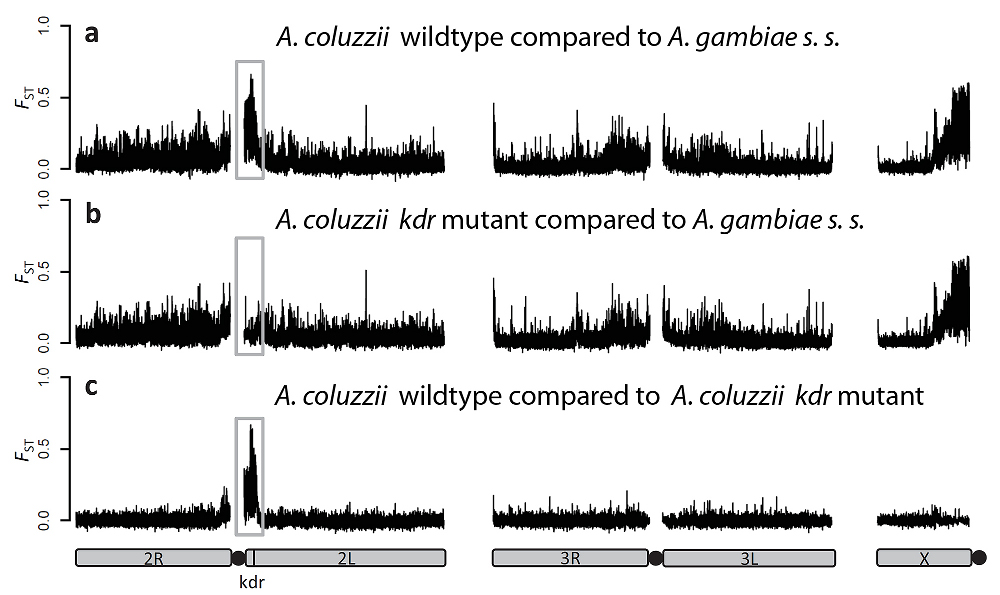Mosquitos swap insecticide-resistance genes

Researchers have exploited a natural experiment created by our use of insecticides to show that large regions of DNA can move between the two types of mosquito that are most important in spread of malaria. The work is important for infection control because it suggests that these mosquitoes can remain distinct species even as they acquire resistance to insecticides from one another.
The team knew that a large section of the mosquito genome was highly different between the two related species Anopheles gambiae s.s. and Anopheles coluzzii. Because of this prominent difference, it was thought the region contained genes important in distinguishing the two species genetically.
Researchers from the Wellcome Trust Sanger Institute collaborated with teams from the Liverpool School of Tropical Medicine and field entomologists in Ghana, to decode genomes of individual wild mosquitoes from southern Ghana. The team found that almost 1.5 per cent of the mosquito genome in A. coluzzii could be replaced by sequence from A. gambiae s.s. when under pressure from insecticide deployment.
The region, which consists of more than three million letters of genetic code, includes an important kdr mutation in a gene called Vgsc. This mutation confers insecticide resistance.
“Our work demonstrates amazing flexibility in the genomes of closely related species. The genomic section replaced is huge and was previously considered a major ‘speciation island’ – a probable location for genes that drive reproductive isolation between the species.
“The findings not only call into question the general importance of speciation islands, but also importantly show that these closely related mosquito species can evolve largely separately but then interchange genetic information to allow rapid adaptation to environmental changes driven by human activity.”
Dr David Weetman Co-first author from the Liverpool School of Tropical Medicine
The finding is especially significant because the two species are very closely related and the region affected is one of relatively few areas in which their genomes differ substantially. Surprisingly, there is very little evidence that this huge genomic disruption drives the two species to form hybrids, rather they remain stable as two separate species despite a dramatic rise in frequency of the kdr mutation in A. coluzzii.
“Through our collaborations we are learning how to use Anopheles genomic information to address questions of immense evolutionary and public health importance. This paper is just a foretaste of the types of studies that the vector community will be able to perform as the Anopheles gambiae 1000 Genome data sets become available.”
Professor Martin Donnelly Senior author of the study from the Liverpool School of Tropical Medicine
The two species, which live side-by-side throughout much of West and Central Africa, exhibit behavioural and ecological differences: Anopheles coluzzii is thought to be able to exploit relatively stable agricultural breeding sites, which can extend malaria transmission far into the dry season. A. gambiae s.s. has traditionally been the more resistant to insecticides, but this is changing with transfer of insecticide resistance mutations.
“This is a wonderful example of how new technologies for genome sequence analysis can elucidate specific biological questions in the field.”
Professor Dominic Kwiatkowski Head of the Malaria Programme at the Wellcome Trust Sanger Institute, whose team has worked closely with the Liverpool School of Tropical Medicine on the project
In addition to the new implication for control of Anopheles mosquitoes, the study was an unusual opportunity to investigate the popular theory that new species form through the development of pockets of divergence in the genome containing speciation genes. Driven by technological advances and early work on the Anopheles gambiae species pair, this has become a rapidly growing area of research in evolutionary biology. The authors caution that even very large, divergent and prominent islands in genomes of two related species might be an unreliable indicator of how important the regions are in speciation.
More information
Funding
This work was supported by Wellcome Trust Sanger Institute and the MalariaGEN resource centre, the US National Institute of Allergy and Infectious Diseases, the Liverpool School of Tropical Medicine and the Wellcome Trust.
Participating Centres
- Department of Vector Biology, Liverpool School of Tropical Medicine, Pembroke Place, Liverpool, UK
- Cape Coast Department of Entomology and Wildlife, School of Biological Science, University of Cape Coast, Ghana
- Biotechnology and Nuclear Agriculture Research Institute, Ghana Atomic Energy Commission, Legon, Accra, Ghana
- Malaria Programme, Wellcome Trust Sanger Institute, Hinxton, Cambridge, UK.
- Department of Microbiology, Immunology & Pathology, Colorado State University, Fort Collins, Colorado, USA
- Wellcome Trust Centre for Human Genetics, University of Oxford, Oxford, UK
Publications:
Selected websites
Anopheles gambiae 1000 Genomes
Anopheles gambiae 1000 Genomes is a global collaboration using whole genome deep sequencing to provide a high-resolution view of genetic variation in natural populations of Anopheles gambiae, the principal vector of Plasmodium falciparum malaria in Africa.
Liverpool School of Tropical Medicine
Liverpool School of Tropical Medicine (LSTM) has been engaged in the fight against infectious, debilitating and disabling diseases since 1898 and continues that tradition today with a research portfolio in excess of well over £200 million and a teaching programme attracting students from over 65 countries.
The Wellcome Trust Sanger Institute
The Wellcome Trust Sanger Institute is one of the world’s leading genome centres. Through its ability to conduct research at scale, it is able to engage in bold and long-term exploratory projects that are designed to influence and empower medical science globally. Institute research findings, generated through its own research programmes and through its leading role in international consortia, are being used to develop new diagnostics and treatments for human disease.
The Wellcome Trust
The Wellcome Trust is a global charitable foundation dedicated to achieving extraordinary improvements in human and animal health. We support the brightest minds in biomedical research and the medical humanities. Our breadth of support includes public engagement, education and the application of research to improve health. We are independent of both political and commercial interests.


